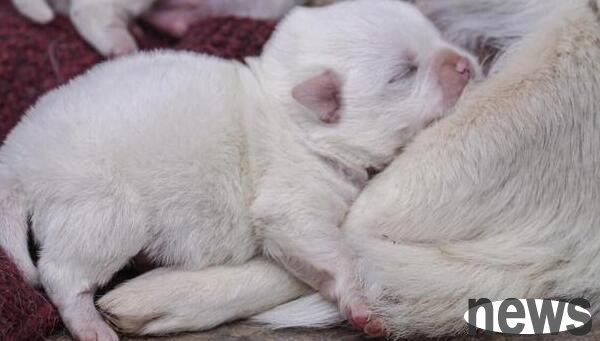The puppy arrives at home for the first week, on the 2nd-3rd day, maybe after returning home yesterday, you find that the little thing at home is just a very well-behaved dog. Maybe it was very lively, but it just slept all day because of motion sickness and didn't wake up until night. But I think, no matter what the situation is, after you get along with the little guy for the first night, this morning, you can already discover the little thing's struggle! The next morning after the puppy arrived home, it is understood that 90% of the owners were awakened by the little guy's whimper or scream. If your puppy did not bark, it might be that you picked up the treasure, and of course, it might be that you bought an unhealthy dog.
Just like serving a baby, it is obviously extremely laborious to take care of a newly weaned little guy. Feeding food and water is a matter of the last word, and taking shit and urine is the first to be affected. Here we suggest that parents keep their dogs in cages in the first three months of the puppy’s arrival at home and release them only at mealtime. After two months, you can increase the vent of peeing and pooping, so that the puppies can learn to go to the toilet faster!

However, if it was the second day after home, it would be impossible for puppies to learn to be fixed or hold their urine. The reason for this is that all parts of the puppies' body have not developed completely (note, at the beginning, we assume that the dog was taken home when they were one month old).
According to our original settings, suppose you brought the Lun family back in a hurry when the little guy was one month old, and the little dog's teeth had not yet been fully released, or had not been released at all. Therefore, it can only eat liquid or semi-liquid food. It is natural to have abundant water resources. Please don’t let the problem of being more shit and urine every day and be grateful for it.
At this time, we cannot blame any random excretion behavior of the puppy, let alone beat and scold, because the puppy has no urinary tract and has not developed completely, so we cannot blame it if we can't hold it in.
What you need to practice is the skill of eating while smelling a cake, and the skill of mopping the floor in one second. Of course, if the house is big, the previous skill can be avoided. You can place the dog in a room away from the dining table. The relatively independent and ventilated environment is also more conducive to cleaning. However, you need to take care of it more when you are free because the puppy needs to be with you.
If you follow what I said, and have been cruel to place the little puppy in a cage for three months, the latter skill can be avoided. This is because if you are forced to force yourself, the puppy will also pee in the cage by itself. This is also beneficial for future fixed-point training. It is very likely that the original cage will become the dog's future toilet.
But if you hit it, all aspects of the puppy are in the first stage of growth and development. Fragile life is easily injured. Three months ago, the puppy's memory is very weak, so it is very likely that stick education is useless. This is another reason why I suggest that the dog will take it home after at least three months. If you can resist the feeling of desperate missing, feeding shit, urine and feeding milk is the matter of dog mother.
Speaking of feeding, some people may ask, which semi-liquid foods are they?

The recipe for one-month-old dogs is recommended as follows:
1. Dog mother's breast milk: If the dog mother is by her side and is willing to continue feeding, breastfeeding is the best. Dog mother's breast milk can give small milk dogs some necessary antibodies
2. Goat milk: People on the market can use fresh pure goat milk powder, or you can also buy
for dogs to use baby rice paste: All dogs are not recommended to feed rice paste. Some dogs will feel soft and diarrhea after eating it, because there are grains in rice paste, and grains are allergic to dogs, so rice paste feeding is only recommended for dogs with too slow teeth.
4. Dog food is soaked in water: It is suitable for dogs with faster teething. In winter, soak dog food for five minutes before giving it to the puppy. Do not use overheated water, because it will destroy some nutrients in dog food. You can use room temperature water in the rest of the seasons, but you can only give it in a small amount at the beginning. It is recommended to use natural food.
Note:
1. When buying baby rice paste, please see the recipe clearly. The ingredients list cannot contain onions and other foods that dogs must not eat. In addition, they can only feed them in a small amount for the first time. Observe whether the puppy has allergic reactions. The stomach and intestines of newborn dogs are fragile. If they have diarrhea, they should stop feeding.
2. Dogs cannot drink milk (including whole milk powder). The lactose in milk is something that dogs cannot metabolize. Both big and small dogs and puppies may suffer from diarrhea, bloating, or even vomiting after eating it. If you have to give milk, you can give pets special milk, or skim milk for human use.
3. Please do not give it any food other than the above two months before the puppy arrives home (before three months old). At this time, the dog's stomach and intestines cannot accept too complicated things, and feeding them randomly can easily cause intestinal diseases.
If the dog experiences adverse reactions such as diarrhea, vomiting, or not eating within the 1-3 days of arrival, it should be fasted immediately and the water should not be cut off.
Dimness, vomiting, etc. may be a dog's stress response (so we say that the first week is the adaptation period for puppies), and of course, it may also be that the dog is sick.
Usually, dogs with stress responses are mentally ok, and there is not much secretion in their eyes.
But if you find that your puppy's eyes are bleed, drowsy, and vomiting with water, you should be careful. Maybe the dog is sick, so you should immediately cut off the water and go to the hospital for relevant examinations.
